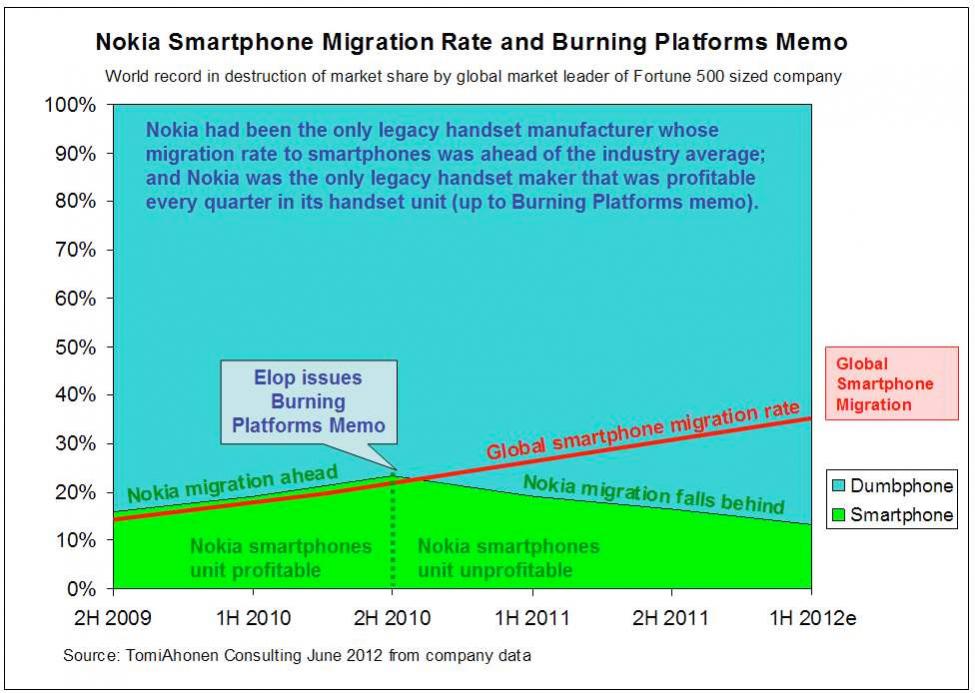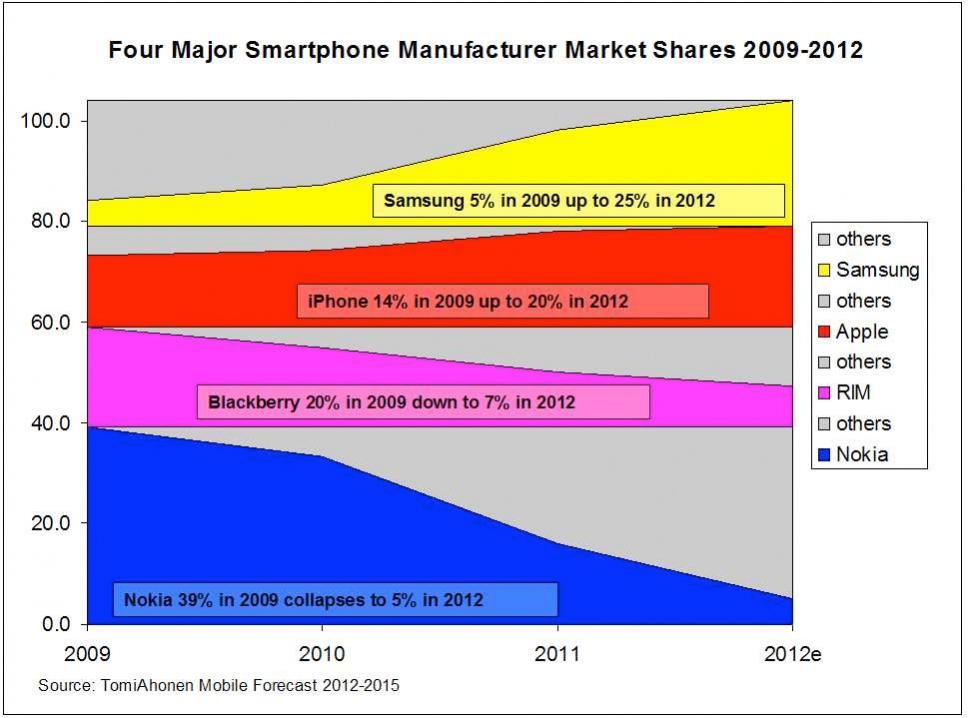News today is that Moody’s has downgraded Nokia to junk status. They also announced that they will lay off 10,000 people (including about 1 in 4 of the people they employ in Finland, where Nokia is headquartered).
For those of you who don’t know all the inside-baseball stuff about Nokia, here is a recent little history. The current CEO of Nokia Stephen Elop came from Microsoft at the start of last year. He wrote a famous (infamous) memo known as the burning platforms (it started with the choice of people on burning oil platform to leap off). Since that memo sales have fallen for 5 consecutive quarters wiping out $13B in revenues and $4B in profits.
The first thing the memo did was to say that current products were not good and as a result people stopped buying them. This is known as the Rattner effect after a very profitable British jewellery chain called Rattners which had a store on every high street in Britain. At a dinner with finance types Gerald Rattner said that the stuff they sold was so cheap because it was “total crap.” It got into the press, people stopped going there and the chain quickly cratered in value and almost went bankrupt.
The next thing Elop did was decide that all smartphones would be based on Microsoft’s Windows Phone. This at a time when Nokia still dominated the smartphone market (outside the US) with phones based on Symbian and another internal operating system called Meego (despite the memo saying sales of Symbian-based smartphones were in terminal decline they were actually growing strongly and outselling Apple 2:1). The only problem was that these WP-based phones would not be available for the best part of a year. This is the Osborne effect, named after a silicon valley businessman (coincidentally also British) who announced that their next product would be compatible with the IBM PC. This was obviously desirable so everyone stopped buying the current products and the company ran out of money before it could deliver the sexy IBM-compatible one.

The effect of all of this is that Nokia has had the biggest loss of market share of any major business anywhere ever. By that measure Elop has to qualify as one of the worst CEOs of any company ever.
And worse, once the Lumia (WP-based) smartphone was available it didn’t sell very well. If you are going to put all your wood behind one arrow it had better be a good one and this one is not.
My go-to guy on anything to do with the phone market in general and Nokia in particular is Tomi Ahonen (who used to work at Nokia, is Finnish, but lives in Hong Kong these days). His view on what is going on are always worth reading. Cell-phones are not sold like other products (DVD players say). You can’t just go and buy any old cell phone and then go find a carrier (at least in most countries). The carriers control which phones get sold and which do not. Many cell-phone carriers also have landline businesses (often one cellphone license would go to the incumbent telecom operator in a country) and there is one thing that they absolutely hate: Skype. And who owns Skype? Microsoft. So the carriers hate Microsoft and aren’t going to do anything to help them. Hence the lukewarm launch of Lumia (on Easter Sunday when all the stores were closed, wonderful). Even Elop admits this saying that retail salespeople “are reticent to recommend Lumia smartphones to potential buyers.” So this hate goes all the way to the front lines.

So Nokia is in trouble, as I’ve said before. Of course they won’t go bankrupt and shut down, someone will buy them. So who? Tomi’s pick is Samsung although that was before the current round of layoffs and firings (he thinks they are damaged goods now). They are the only company other than Apple making any real money in handsets and would have huge market share, pick up some additional manufacturing lines in other parts of the world and so on. Microsoft could buy them but it would be easier for them to keep Nokia on life support by sending them money. Lots of people, in particular, Apple, could buy them for patents (although Nokia has been selling a lot of patents to keep afloat) and to stop Samsung getting them. Facebook could buy them if they really wanted to be in the handset business (but at lot of Nokia’s business is “feature phone” i.e. dumb phone). Lots of other choices of course. But this blog has gone on long enough.









A Century of Miracles: From the FET’s Inception to the Horizons Ahead